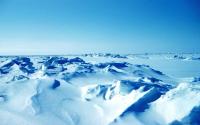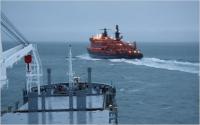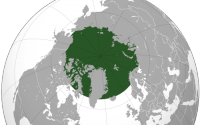Arctic Environment

Quicktabs: Keywords

Delegations from nine countries and the European Union will gather in Greenland this week to sign an accord to help protect Arctic marine ecosystems that have only recently become accessible because of the melting ice cap. The Agreement to Prevent Unregulated High Seas Fisheries in the Central Arctic Ocean marks the first time that nations have worked together so proactively to protect an ocean environment before the start of commercial fishing.
[ More ]
A massive floating nuclear power plant is now making its way toward its final destination at an Arctic port, after Russia's state nuclear corporation Rosatom launched the controversial craft over the weekend. It's the first nuclear power plant of its kind, Russian officials say.
[ More ]
A new report finds that the Arctic has a serious litter problem: in just ten years, the concentration of marine litter at a deep-sea station in the Arctic Ocean has risen 20-fold.
[ More ]
Confirming earlier research, scientists reported Wednesday that global warming is altering the ecology of the Arctic Ocean on a huge scale.
[ More ]
Synthesizing much past academy work on the Arctic region, a new report from the National Academy of Sciences reports on the many ways that changes in the Arctic will reverberate well beyond it and, in some cases, have planet wide consequences.
[ More ]
The Arctic could become a site of future turmoil, and not just because of the emerging geopolitical tensions and militarization in the region. Beyond concerns of a frozen conflict in the icy north, there is the additional fear that the Barents and Kara Seas could become the location of a slow-motion nuclear disaster. Until 1991 the Soviet Union used the seas as a junkyard where it would dispose of its nuclear waste and several of its scuttled nuclear submarines could create Chernobyl-like environmental catastrophes.
[ More ]
A new report from the International Council on Clean Transportation on air pollution from ships in the high Arctic warns of huge increases in air pollution from shipping.
[ More ]
Russia’s state nuclear corporation Rosatom is working on a roadmap exploring where to build final repositories for nuclear waste. Ten pre-selected locations in Northwest-Russia are now under consideration, including permafrost sites on Novaya Zemlya and Nenets Autonomous Okrug. Norway wants to have a say before any decisions are taken.
[ More ]
As the Arctic ice melts, new shipping routes are opening up for tourism, mining and other commercial purposes, cutting journey times and fuel costs. And as Christopher Ware reports, a new danger arises - invasive alien species disrupting fragile Arctic ecosystems.
[ More ]
The massive oil spill in the Gulf of Mexico is a warning, conservationists say, of what could happen in the Arctic as melting sea ice opens the Arctic Ocean to oil and gas drilling. Many experts argue that the time has come to adopt an Arctic Treaty similar to the one that has safeguarded Antarctica for half a century.
[ More ]No nation, including the United States, disputes the moral and economic imperative to protect the Arctic’s pristine environment. The United States understands the fragility of the region and the need to practice responsible stewardship while pursuing its Arctic interests.39 UNCLOS plays a prominent but not exclusive role in this regard.
UNCLOS creates an obligation to “protect and preserve the marine environment.”40 However, it avoids specific rules or standards in favor of creating zones of regulatory competence and providing a framework of principles designed to encourage the creation of more specific rules and standards through domestic regulation and separate international agreements.
UNCLOS provides states with exclusive, sovereign jurisdiction to regulate the environment within their territorial sea.41 States also have sovereign rights “for the purpose of exploring and exploiting, conserving and managing the natural resources . . . of the waters superjacent to the seabed and of the seabed and its subsoil,”42 and “jurisdiction . . . with regard to . . . the protection and preservation of the marine environment” in the exclusive economic zone (EEZ).43 In exercising rights and performing duties in the EEZ, coastal states must do so with “due regard” for the rights and duties of other states,44 not the least of which is freedom of navigation.
The environment and the management of natural resources are the most pressing security issue in the North. States are committed to addressing issues of boundaries and Arctic Ocean access through existing institutions, principally UNCLOS. Large-scale damage to the Arctic environment from transportation accidents, energy development, fishing, tourism, and the long-range transport of pollutants from the South pose greater immediate threats than classic security issues. Emergency response systems and contingency plans for the North are needed to respond to possible ship disasters, industrial pollution, oil spills, etc. Such a response system is currently non-existent or not up to the task. Given the increased shipping activity in the Arctic and the lack of ports and rescue capability, the need is growing. This should be a task for the Arctic Council in cooperation with existing specialized bodies such the International Maritime Organization.
The need for large-scale ecosystem-based management regimes to pro- tect the integrity of the Arctic Ocean is receiving increasing attention, including proposals for an Arctic Treaty or Park to manage and protect the Arctic Ocean as a commons. These proposals underlie the need for a strong Arctic Council and U.S. participation in UNCLOS in order to provide institutional protection for the Arctic Ocean.
There is also a significant problem with the generality of environmental protections in the UNCLOS. As mentioned previously, the treaty purports to regulate activity in all of the world’s oceans.136 It does not, therefore, deal explicitly with the very unique problems facing the Arctic environment.137 Unless the international community recognizes the region’s special needs, its natural environment will continue to worsen and become even more difficult to restore.
Increased oil and gas development will adversely affect the Arctic through increased oil spills and development infrastructure.14 Oil spills are more likely in the Arctic because oil tankers are not built to withstand collisions with sea ice, which is becoming more mobile and unpredictable as the Arctic warms.15 Oil spills are especially dangerous in the Arctic because of the region’s cold temperatures, which decrease rates of oil decomposition, resulting in the elimination of wildlife habitats and feeding grounds affected by any spills.16 Elimination of habitat and feeding grounds will have a profound effect on Arctic species, which rely on a short food chain that can be fatally disrupted by the loss of even a single species.17 These adverse effects will be compounded by increased oil and gas development infrastructure, which will include an array of new support facilities on land, oil rigs at sea, on- and off-shore pipelines, and increased air, land, and sea transportation.18 This infrastructure will interfere with wildlife feeding, breeding, rest, and migration.19 The Arctic is, by its nature, an unusually vulnerable environment and global warming compounds this vulnerability.20 The adverse effects of increased oil and gas exploration would even further aggravate the region’s vulnerability.21
The ecosystem of the Arctic is more susceptible to pollution than other parts of the world which is even more critical because the Arctic region plays a key role in maintaining the health of the global environment.
